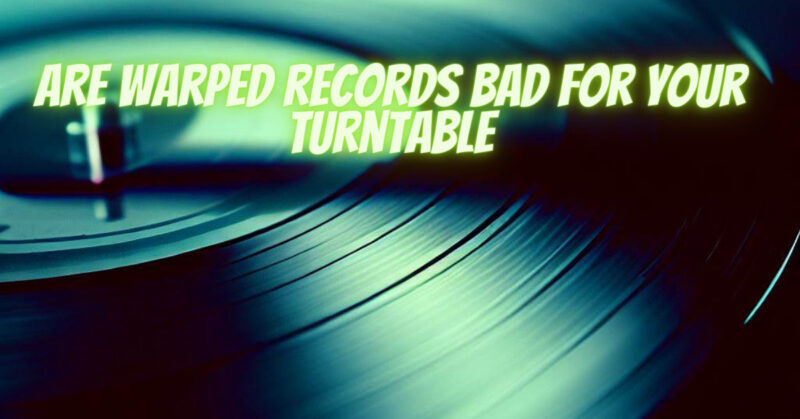Vinyl records have made a remarkable comeback in recent years, enchanting music lovers with their warm, authentic sound. However, one concern that often arises among vinyl enthusiasts is the potential impact of warped records on their precious turntables. In this article, we will delve into the effects of warped records on turntables, addressing the common questions and misconceptions surrounding this issue.
Understanding Vinyl Record Warping: Vinyl records can become warped due to various factors, including improper storage, exposure to extreme temperatures, or manufacturing defects. Warping leads to a slightly uneven surface, causing the record to wobble when played on a turntable. This raises concerns about the potential harm warped records may inflict on turntables.
Effects of Warped Records on Turntables: Contrary to popular belief, minor warping in vinyl records is unlikely to cause significant damage to your turntable. Modern turntables are designed to handle slight imperfections in record surfaces without sustaining serious harm. However, severe warping or prolonged use of severely warped records can lead to a few potential issues:
- Needle Jumping and Skipping: When a turntable encounters a warped section of a record, the needle may struggle to maintain consistent contact with the grooves. This can cause the needle to jump or skip, resulting in an interrupted playback experience.
- Uneven Tracking Force: In the presence of severe warps, the tracking force—the pressure exerted by the turntable’s tonearm on the record—may fluctuate. This uneven tracking force can put additional stress on the turntable’s suspension system, potentially affecting its performance and longevity.
- Accelerated Wear on Components: Prolonged playback of severely warped records can lead to increased wear on various components of the turntable. The stylus, tonearm, and platter bearing may experience additional strain, potentially shortening their lifespan.
Mitigating the Risks: While minor warping is generally harmless, taking certain precautions can help minimize the risks associated with playing warped records on your turntable:
- Inspecting Records: Before playing a record, visually inspect it under proper lighting to identify any visible warping. Severe warps, such as pronounced “ski slope” effects, are more likely to cause issues.
- Adjusting Tracking Force: Ensure that your turntable’s tracking force is properly calibrated according to the manufacturer’s instructions. This will help the stylus navigate uneven surfaces more effectively.
- High-Quality Components: Investing in a well-built turntable with high-quality components can enhance its ability to handle minor warps without significant consequences. A sturdy tonearm and a reliable suspension system are particularly important.
- Proper Storage: Store your vinyl records in a controlled environment, away from direct sunlight, extreme temperatures, and high humidity. Maintaining optimal storage conditions can help prevent warping.
- Repair or Replace: If you have severely warped records that consistently cause issues, consider professional repair or replacing them to protect both your turntable and the listening experience.
Conclusion:
While warped records can potentially cause issues with turntable performance, the majority of minor warps are unlikely to cause significant harm. Modern turntables are designed to withstand minor imperfections in record surfaces. By adopting good maintenance practices, inspecting records, adjusting tracking force, and investing in quality turntable components, vinyl enthusiasts can enjoy their collections without undue worry. Remember, responsible handling, regular maintenance, and proper storage are key to preserving the longevity and optimal performance of both your records and your turntable.


